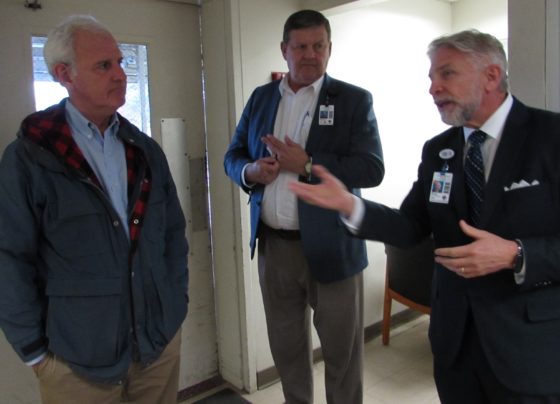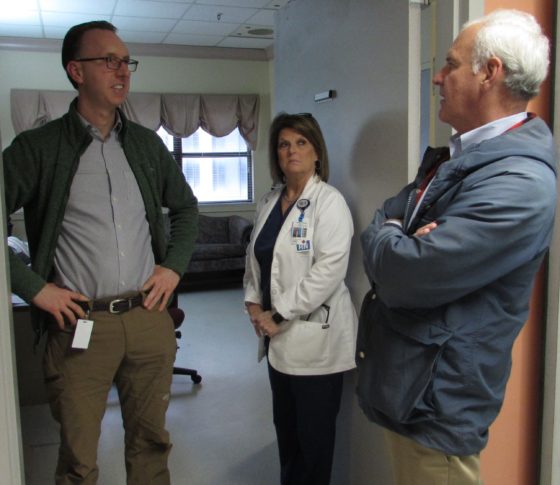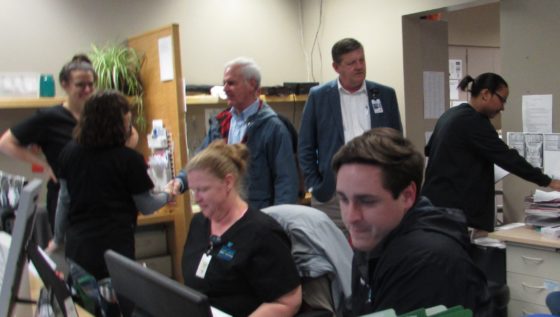Bradley Byrne makes campaign visit to WRH
U.S. Rep. Bradley Byrne made a two-day swing through the Black Belt last week to learn more about the area as he makes a run for the U.S. Senate.
Byrne, who is beginning his seventh year representing the 1st Congressional District of Alabama, spent more than two hours at Whitfield Regional Hospital, hearing of its successes and the challenges it faces along with rural hospitals around the country.

Meeting with Byrne were CEO/Administrator Doug Brewer, Clinical and Community Services director Dereck Morrison and Director of Nursing Donna Pope.
Byrne and with 7th Congressional District Rep. Terri Sewell successfully pushed for a change in the wage index, the rate at which hospitals are reimbursed for salaries. WRH and other rural hospitals now can be more competitive in what they offer employees.
The candidate showed surprise that Marengo County approved a four-mill tax to benefit WRH in December. “Alabama doesn’t pass ad valorem taxes,” he said.
Brewer told Byrne the hospital is working with investment brokers Frazer Lanier to offer bonds of $15 million as soon as possible to make needed changes. Brewer added further efforts are being made with the U.S. Department of Agriculture to tap into other sources of income.
Byrne asked what he needed to hear from hospitals, and Brewer was quick to answer that rural hospitals need to have the financial motivation to keep chronic care patients close to home. The longer patients are kept in the local hospitals, the more hospitals are reimbursed for their care instead of sending them to larger, big-city facilities and taking dollars away from the community.

“We’ve got to keep rural hospitals open,” stressed Byrne. It costs more in dollars and in stress on the patient to transport to another facility, he said.
“If you lose a hospital, you don’t get it back (easily),” he went on. Closing a hospital also has a negative impact on attracting businesses and providing other services to the community.
The federal government likes “big,” and it’s trying to drive patients to big hospitals, he continued. “We’ve got to change their mindset completely,” he said.
Thanking Byrne for his efforts, Brewer said what is greatly helping WRH is the passage of new guidelines for the wage index. A labor market area’s wage index value is the ratio of the area’s average hourly wage to the national average hourly wage.

Byrne said it took five years to get the wage index changed to benefit rural hospitals., what Brewer called “the single most important thing that’s come out of Washington.”
In addition to all the improvements and additional services, Brewer said the board is looking at a long-range plan to expand medical telemetry to rural health clinics and become a regional hub for transplant patients.
Byrne sees the need to offer all citizens access to health care and backs to proposal to enable people to buy health insurance across state lines, currently not allowed.
Byrne said he is running for the seat now held by Sen. Doug Jones because he has found even a freshman senator has more power that a representative who has served for many years. While Byrne said he is a friend of Jones, he doesn’t believe Jones represents the people of Alabama.
Toward the end of his visit Byrne talked about other issues that are concerning him.
National security: “America went to sleep for a while,” he said. He supports President Donald Trump’s decision to assassinate Iranian Gen. Qassem Soleimani, although he acknowledged that the U.S. will be facing repercussions from the action.
China, Russia, North Korea, Iran and terrorist groups around the world all pose a threat to the United States, he said. “We’ve got to have the strength and patience to stay the course.”
Immigration: Byrne said he sees border security as personal security. He also added that the current asylum system must be changed.
Infrastructure: He will not support any infrastructure bill unless money is set aside for rural areas. The government must step in to help rural areas with not only roads and bridges but with broadband service, just as it did with providing electricity to rural America.
Employment: Keeping rural areas viable is a big problem, he said. As a member of the House Education and Labor Committee, he understands the importance of having a trained work for to attract business and industry.

